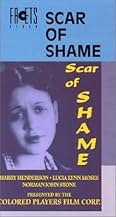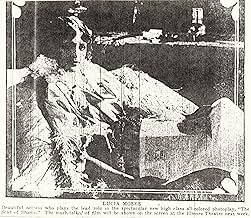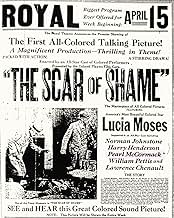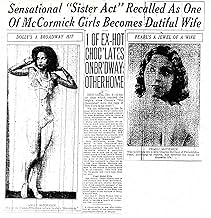A black musician marries a woman facing abuse from her stepfather to rescue her. After the marriage, he refuses to introduce her to his mother, fearing his mother's disapproval of her lower ... Read allA black musician marries a woman facing abuse from her stepfather to rescue her. After the marriage, he refuses to introduce her to his mother, fearing his mother's disapproval of her lower socioeconomic status.A black musician marries a woman facing abuse from her stepfather to rescue her. After the marriage, he refuses to introduce her to his mother, fearing his mother's disapproval of her lower socioeconomic status.
- Awards
- 1 nomination total
Charles Gilpin
- Lido Club Gambler
- (uncredited)
Shingzie Howard
- Louise's Maid
- (uncredited)
- Director
- Writer
- All cast & crew
- Production, box office & more at IMDbPro
Featured reviews
An all black silent film made exclusively for black audiences in the 1920s (back then theatres were segregated). Poor but beautiful Louise Howard (Lucia Lynn Moses) is beaten by her stepfather (William E Pettus) but dreams of a better life. She meets good honest Alvin Hillyard (Harry Henderson) and he falls in love with her. But her stepfather and evil Eddie Blake (Norman Johnson) aren't going to let her go without a fight.
Interesting from a historical standpoint and not too bad as a drama either. It does get overly melodramatic with a lot of eye-rolling speeches and gets more than a little ridiculous during it's last half hour but I was never bored. The acting is actually pretty good and it moves quickly. Also the cards telling us what's going on have some interesting designs. When Blake is introduced there's a wolf shown on the title card! So, a pretty good movie. Also interesting to see how blacks were shown and treated back then. A 7.
Interesting from a historical standpoint and not too bad as a drama either. It does get overly melodramatic with a lot of eye-rolling speeches and gets more than a little ridiculous during it's last half hour but I was never bored. The acting is actually pretty good and it moves quickly. Also the cards telling us what's going on have some interesting designs. When Blake is introduced there's a wolf shown on the title card! So, a pretty good movie. Also interesting to see how blacks were shown and treated back then. A 7.
7tavm
Since it's once again Black History Month, I thought I'd once again review various movies made by people of color for the occasion. This production of the Colored Players Film Corporation (which was co-founded by one African-American, Sherman H. Dudley, a former stage performer) was quite compelling as a cautionary drama though the melodramatic trappings do permeate. Still, there were quite some good performances by the cast of which one of them, a Lucia Lynn Moses, was quite alluring in going from a victimized girl to one trying to be more seductive. It's interesting finding out on this site she filmed this in Philadelphia while also commuting to New York as a chorus girl at the Cotton Club. I don't feel like revealing much else so on that note, I recommend The Scar of Shame.
THE SCAR OF SHAME (1927) is one of the few surviving movies from the silent era to feature an all black cast. It tells the story of Alvin Hillyard, an educated musician from the black upper class, and Louise Howard, a woman from "the other side of the tracks". When her drunken father starts to beat her, Alvin, who is staying at a nearby boarding house, intervenes and brings her to the house so that she may escape from her father's clutches. The two eventually fall in love and marry, but their differences in station complicate their lives in a way that neither would have imagined
.
SCRIPT: THE SCAR OF SHAME has a premise worthy of exploration – the differences in social classes among blacks – that would never have been attempted in mainstream Hollywood movies at the time. It also proposes that the environment in which one is raised unalterably shapes one's future, an idea that was explored in the naturalistic novels of authors such as Stephen Crane and Frank Norris. Unfortunately, the narrative starts to sag in the middle of the movie, and relies on melodramatic plot turns at times. Louise in particular does things that seem to have no motivation either emotionally or rationally. This causes the film to lose its way somewhat and stops the movie from exploring the its theme more successfully. The assertion is that Louise's strange behavior is due to her inability to overcome her environment, but it's not made entirely clear in the exposition. Still, the movie's screenplay does have considerable virtues. Instead of completely villainizing Louise's father, the writers attempt to balance his character out with regret over his treatment of her, and you can see his struggle to overcome his weakness. Alvin Hillyard is presented as a sympathetic character that wants to do what is right. The movie also scores points for not portraying any characters as buffoons, an all-too-common tendency at that time. SCORE: 7/10
ACTING: The acting is generally quite restrained and believable. The two leads, Harry Henderson and Lucia Lynn Moses, show ease before the camera and contribute solid performances that are scaled for the intimacy of the camera. The ensemble cast plays effectively in an understated manner, generally avoiding the mugging and melodramatics that could occur frequently during the silent era. Pearl McCormack is particularly effective as Alice Hathaway, a young woman with whom Hillyard falls in love years after the breakup of his marriage to Louise. William Pettus also does fine work in his portrayal of Louise's father, with a finely balanced performance that shows his character as a flawed human being instead of a mere monster. SCORE: 9/10
CINEMATOGRAPHY/PRODUCTION: The camera-work is solid and the editing is well done (there was one slight repetition of frames early on). The director, Frank Perugini, and the cameraman, Al Liguori, show a good command of the use of silent film as a visual storytelling medium. There are some interesting touches here and there that contribute to the narrative – specifically the use of a baby doll to show the couple's hopes and aspirations at first, and then the way their relationship deteriorates later. There is also some interesting cross cutting during a climactic scene. Some scenes are a bit static but not too lengthy. SCORE: 8/10
SUMMARY: THE SCAR OF SHAME tackles an issue that mainstream films would never have touched at the time of its release. In spite of the flaws of its narrative and characterizations, the actors do uniformly fine work in their portrayals. The movie is competently filmed and produced with occasional outstanding moments of visual interest. The film does deserve commendation for its portrayal of the complexities of life within the black community of the early 20th century. SCORE: 8/10
SCRIPT: THE SCAR OF SHAME has a premise worthy of exploration – the differences in social classes among blacks – that would never have been attempted in mainstream Hollywood movies at the time. It also proposes that the environment in which one is raised unalterably shapes one's future, an idea that was explored in the naturalistic novels of authors such as Stephen Crane and Frank Norris. Unfortunately, the narrative starts to sag in the middle of the movie, and relies on melodramatic plot turns at times. Louise in particular does things that seem to have no motivation either emotionally or rationally. This causes the film to lose its way somewhat and stops the movie from exploring the its theme more successfully. The assertion is that Louise's strange behavior is due to her inability to overcome her environment, but it's not made entirely clear in the exposition. Still, the movie's screenplay does have considerable virtues. Instead of completely villainizing Louise's father, the writers attempt to balance his character out with regret over his treatment of her, and you can see his struggle to overcome his weakness. Alvin Hillyard is presented as a sympathetic character that wants to do what is right. The movie also scores points for not portraying any characters as buffoons, an all-too-common tendency at that time. SCORE: 7/10
ACTING: The acting is generally quite restrained and believable. The two leads, Harry Henderson and Lucia Lynn Moses, show ease before the camera and contribute solid performances that are scaled for the intimacy of the camera. The ensemble cast plays effectively in an understated manner, generally avoiding the mugging and melodramatics that could occur frequently during the silent era. Pearl McCormack is particularly effective as Alice Hathaway, a young woman with whom Hillyard falls in love years after the breakup of his marriage to Louise. William Pettus also does fine work in his portrayal of Louise's father, with a finely balanced performance that shows his character as a flawed human being instead of a mere monster. SCORE: 9/10
CINEMATOGRAPHY/PRODUCTION: The camera-work is solid and the editing is well done (there was one slight repetition of frames early on). The director, Frank Perugini, and the cameraman, Al Liguori, show a good command of the use of silent film as a visual storytelling medium. There are some interesting touches here and there that contribute to the narrative – specifically the use of a baby doll to show the couple's hopes and aspirations at first, and then the way their relationship deteriorates later. There is also some interesting cross cutting during a climactic scene. Some scenes are a bit static but not too lengthy. SCORE: 8/10
SUMMARY: THE SCAR OF SHAME tackles an issue that mainstream films would never have touched at the time of its release. In spite of the flaws of its narrative and characterizations, the actors do uniformly fine work in their portrayals. The movie is competently filmed and produced with occasional outstanding moments of visual interest. The film does deserve commendation for its portrayal of the complexities of life within the black community of the early 20th century. SCORE: 8/10
OK first of all let's face it. Some films during the silent era can be boring and painful to actually get into, but are more worth the watch for the visuals of what things were like back then. I personally like watching them because there aren't a crazy amount of them left and it is fun to fantasize what it would have been like back then. I always feel like there are not enough words to justify having words at all during the films. This film is a silent black film with a great story. It doesn't put you to sleep and it has some powerful silent acting along with a powerful story about class. (This movie is called a race film bc it was a film made for black people starring black people. It does not mean that this movie is about racial issues with other races, but about a couple who marries each other outside of their classes and how the female lead has a very difficult time adjusting to a higher class life.) It is definitely worth the watch. It is very sad how many very early films such as this did not make it through the years. Watch them and appreciate them.
Despite having an all African-American cast, this film doesn't deal explicitly with race, as its script could have been applied to white people, which is a nice thing for 1927. The film is in part about the dynamic between social classes, and has some good early scenes that deal with that. In one, we see the intertitle "One half the world doesn't know how the other half lives" while a poor woman is scrubbing the laundry over a washboard. Eventually it gets a little bit pushy in its message, which is for people to choose higher aspirations in life (education, the arts, steady jobs) vs. lower (gambling, drinking, violence), making it a simplistic morality tale, and one that is of course directed at the African-American community.
In that sense, it has everything to do with race, and says (1) look, we're people too, not the stereotypes Hollywood and white supremacist culture ordinarily portrays us to be (2) we can do better, that "Our people have much to learn." The plot and the love triangle which develops in the second half is more than a little melodramatic, but the screen presence of all three leads is undeniable (Harry Henderson, Lucia Lynn Moses, and Pearl McCormack), and had these actors been white they all might have been stars of the era. The film is pretty well made as well, making it a silent worth checking out.
In that sense, it has everything to do with race, and says (1) look, we're people too, not the stereotypes Hollywood and white supremacist culture ordinarily portrays us to be (2) we can do better, that "Our people have much to learn." The plot and the love triangle which develops in the second half is more than a little melodramatic, but the screen presence of all three leads is undeniable (Harry Henderson, Lucia Lynn Moses, and Pearl McCormack), and had these actors been white they all might have been stars of the era. The film is pretty well made as well, making it a silent worth checking out.
Did you know
- TriviaFilm scholar Donald Bogle called this movie quite possibly the best independent black film of the silent era.
- GoofsAfter Alvin leaves his mother's house, the butler reaches down to pick up the dropped key with his left hand, the next shot is a closeup of him picking up the key with his right hand. The next shot he is standing up with the key in his left hand.
- Quotes
Title Card: One half the world doesn't know how the other half lives.
- Alternate versionsThe Library of Congress Video Collection has a restored version of this film with a new piano score composed and performed by Philip Carli. Its running time is 76 minutes. A small missing section is summarized by an intertitle. Other restoration credits: Simmon, Scott ....... restoration producer Fleming, Dina T. .... restoration production co-ordinator McConnell, Allan .... restoration magnetic recording laboratory head Winther, James ...... restoration videotape transfer and editor Chrisman, Paul ...... restoration music recordist DeAnna, Gene ........ restoration titles
- ConnectionsFeatured in American Experience: Midnight Ramble (1994)
Details
- Runtime
- 1h 8m(68 min)
- Color
- Sound mix
- Aspect ratio
- 1.33 : 1
Contribute to this page
Suggest an edit or add missing content




















